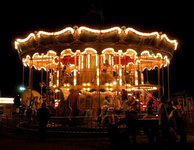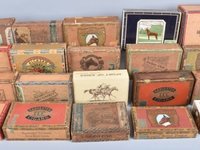Theseus
¥
One of the many characters to pressure people to buy their wares is the razor blade seller. The full sentence is this:- Περνάνε κι άλλοι. Ο ξυροφάκιας ξυραφάκιας, το φωτεινό ιπποδρομίο ιπποδρόμιο, τσατσάρες και μπανελάκια για κολλάρα.
Does he actually sell miniature lit-up racecourses?? I've no real idea what it really means. An item like this would be rather large to fit on a seller's tray of wares! What is this φωτεινόιπποδρομίο ιπποδρόμιο; :twit:

Does he actually sell miniature lit-up racecourses?? I've no real idea what it really means. An item like this would be rather large to fit on a seller's tray of wares! What is this φωτεινό


